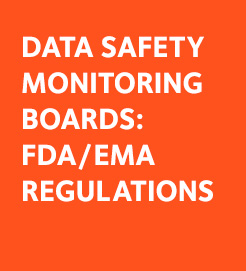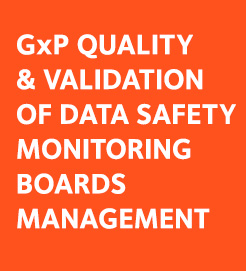Academic Research Organization (ARO)
Typically, part of a university, publicly or privately funded, for- or not-for-profit, provide expertise in medical, scientific or technical fields.
Chairperson
The person who presides a committee and ensures procedures are followed as per Charter.
DSMB Charter
A document describing all roles and processes of a DSMB committee.
The DSMB Charter is the document describing the role, scope and process followed by the DMC for any particular clinical trial and is important to prove that procedures were pre-specified and thereby reduce concerns that operations inappropriately influenced by interim data could bias the trial results and interpretation.
The DMC members (as a minimum the chairperson) must participate to the authoring of the charter and all must sign the final document and receive appropriate training. Health Authorities may request that the sponsor submit the charter well in advance of the performance of any interim analyses, ideally before the initiation of the trial along with the protocol.
Closed session
A session of the DMC that cannot be attended by sponsor representatives because unblinded information is shared. Closed sessions are used to review grouped safety and, if appropriate, efficacy data with the study statistician(s) available for consultation. Grouped data should be presented by coded treatment arm. These sessions are normally attended only by voting members to ensure complete objectivity as they discuss outcome results, make decisions, and formulate recommendations regarding the study.
Committee
A group of persons supervising a clinical trial.
Coordinator(s)
The staff person(s) coordinating a committee’s operations and procedures.
Data Monitoring Committee (DMC)
A Data Monitoring Committee is a group of independent experts external to a study assessing the progress, safety data and, if needed, critical efficacy endpoints of a clinical study. In order to do so, a DMC may review unblinded study information (on a patient level or treatment group level) during the conduct of the study. Based on its review, the DMC provides the sponsor with recommendations regarding study modification, continuation or termination. Data Monitoring Committees also go under different names such as Independent Data Monitoring Committe (IDMC), Data Monitoring Board (DMB) or Data Safety Monitoring Board (DSMB).
Data Safety Monitoring Board (DSMB)
"A Data Safety Monitoring Board is a group of individuals with pertinent expertise that reviews on a regular basis accumulating data from one or more ongoing clinical trials. The DSMB advises the sponsor regarding the continuing safety of trial subjects and those yet to be recruited to the trial, as well as the continuing validity and scientific merit of the trial"1 A Data Safety Monitoring Board is another frequently used name to describe the Data Monitoring Board or Data Monitoring Committee.
Endpoint Adjudication Committee
Also called Endpoints Adjudication Committee or Clinical Event Committee. In clinical studies where endpoints are complex to assess and/or include subjective components or the study cannot be blinded, an Endpoint Adjudication Committee, consisting of clinical experts in a specific clinical area, might be set up to harmonize and standardize endpoint assessment in a blinded way.
Ethics Committee (EC)
The Ethics Committee is an independent body in a member state of the European Union, consisting of healthcare professionals and non-medical members, whose responsibility is to protect the rights, safety and wellbeing of human subjects involved in a clinical trial and to provide public assurance of that protection, by, among other things, expressing an opinion on the clinical trial protocol, the suitability of the investigators involved in the trial and the adequacy of facilities, and on the methods and documents to be used to inform trial subjects and obtain their informed consent1.
Executive closed session
A session of the DMC attended by the DMC Chair and specified sponsor representatives to discuss the recommendations of the DMC, often in the form of a brief teleconference. A written summary that describes the individual findings, overall safety assessment and DMC recommendations is communicated by the chairperson to the sponsor after the session.
Form(s)
Used by the Committee members to perform and record their assessment. The forms can be processed as paper or, as online fillable forms.
Institutional Review Board (IRB)
Under the US FDA regulations, an IRB is an appropriately constituted group that has been formally designated to review and monitor biomedical research involving human subjects. In accordance with FDA regulations, an IRB has the authority to approve, require modifications in (to secure approval), or disapprove research. This group review serves an important role in the protection of the rights and welfare of human research subjects.
The purpose of IRB review is to assure, both in advance and by periodic review, that appropriate steps are taken to protect the rights and welfare of humans participating as subjects in the research. To accomplish this purpose, IRBs use a group process to review research protocols and related materials (e.g., informed consent documents and investigator brochures) to ensure protection of the rights and welfare of human subjects of research2.
Open session
A session of the DMC that can be attended by sponsor representatives. Open sessions are used to review the general conduct and progress of the study including adverse events and toxicity issues, accrual, summaries of demographic characteristics, disease status of subjects (if relevant), comparability of groups with respect to baseline factors, protocol compliance, site performance, quality control, and timeliness and completeness of follow-up.
Quality Control
A set of procedures, measurements and metrics used to control and maintain the quality of the process and outcomes.
Reviewer(s)
In the context of a DSMB, there are independent expert(s) in charge of a clinical trial’s assessment.
Reviewers Qualification
The procedures ensuring that every Reviewer included in the Committee is well qualified (with appropriate training) for the Clinical Assessments requested by the Charter. DMC members must have proven qualifications attesting of their expertise in the medical field in which the trial is investigating or in a relevant field (e.g., biostatistics) and must receive appropriate training on the trial methodology and focus. Members’ credentials are to be submitted to the sponsor, filed in the Trial Master File (TMF) and submitted upon request to health authorities.
Steering Committee
Acts as a body that takes responsibility for the scientific integrity of a clinical trial, the scientific validity of the study protocol, the study quality, and the scientific quality of the final study report. Steering Committees are often set up in large clinical trials. Usually appointed by the sponsor, they may include investigators, clinical experts not directly involved in the clinical trial, and sponsor staff. A Steering Committee often acts as a body that takes responsibility for the scientific integrity of a clinical trial, the scientific validity of the study protocol, assessment of study quality and conduct as well as for the scientific quality of the final study report.
Study Team
The Study Team consists of members from the sponsor’s staff from different disciplines overlooking the daily work of a clinical study.
Workflow
The procedure, as described in the Committee Charter, by which the review is made.

 Improving DSMB Inspection Readiness
A practical roadmap for DSMB oversight
READ MORE
eDSMB Software
Open/Close sub menu
Improving DSMB Inspection Readiness
A practical roadmap for DSMB oversight
READ MORE
eDSMB Software
Open/Close sub menu
 CRO-Safe
CRO-Safe Improving DSMB Inspection Readiness
A practical roadmap for DSMB oversight
READ MORE
eDSMB Software
Open/Close sub menu
Improving DSMB Inspection Readiness
A practical roadmap for DSMB oversight
READ MORE
eDSMB Software
Open/Close sub menu
 CRO-Safe
CRO-Safe

